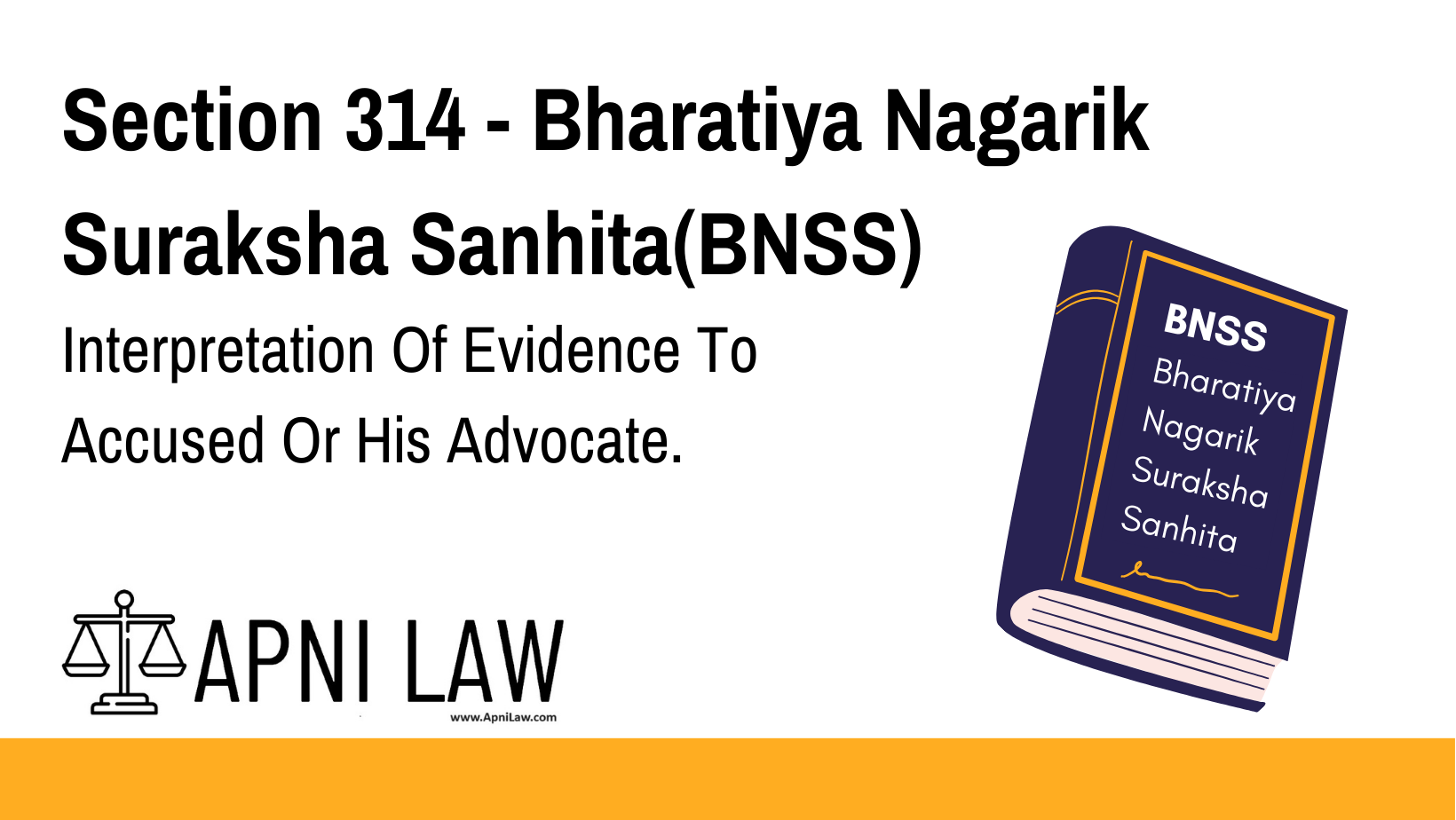Code: Section 314 BNSS
314. (1) Whenever any evidence is given in a language not understood by the accused, and he is present in Court in person, it shall be interpreted to him in open Court in a language understood by him.
(2) If he appears by pleader and the evidence is given in a language other than the language of the Court, and not understood by the pleader, it shall be interpreted to such pleader in that language.
(3) When documents are put for the purpose of formal proof, it shall be in the discretion of the Court to interpret as much thereof as appears necessary.
Explanation of Section 314 BNSS
Section 314 BNSS ensures that all evidence presented in a court proceeding is accessible and comprehensible to all parties involved. The key elements of this section are:
- Interpretation for the Accused:
If evidence is presented in a language that the accused does not understand, and the accused is present in court, the evidence must be interpreted to him in open Court in a language he understands. This guarantees that the accused is fully aware of the testimony and evidence against him. - Interpretation for Pleaders:
In cases where the accused appears through a pleader, and the evidence is given in a language other than that of the Court—and is not understood by the pleader—the evidence must be interpreted to the pleader in the language in which it is given. This provision ensures that legal representatives can effectively advocate on behalf of their clients by understanding all aspects of the evidence. - Interpretation of Documents for Formal Proof:
When documents are submitted for formal proof, the Court has the discretion to interpret parts of the document as necessary. This helps clarify critical details in the documents, ensuring that all material facts are clearly understood by the Court and the parties.
This section is crucial for safeguarding the rights of the accused and ensuring fairness in judicial proceedings by making sure that language barriers do not obstruct the administration of justice.
Illustration
Example 1: Interpretation for the Accused
In a criminal trial, a key piece of evidence is presented in a regional language that the accused does not understand. Recognizing this, the Court orders an interpreter to translate the evidence live in open Court. The accused listens to the interpretation in a language he understands, ensuring that he is fully informed of the proceedings.
Example 2: Pleader’s Requirement
During a civil case, the evidence is given in a language that differs from the language of the Court. The accused is represented by a pleader who does not understand that language. The Court arranges for an interpreter to provide a translation to the pleader in the language of the evidence, thereby allowing the pleader to effectively represent the accused’s interests.
Example 3: Interpreting Documents for Formal Proof
In a trial, an important contract is submitted as evidence. The document contains technical terms and phrases in a language different from the Court’s language. The presiding Judge, exercising discretion under Section 314(3), interprets the key portions of the document that are necessary to ascertain its meaning and relevance to the case, thereby ensuring that the document is properly understood and its evidentiary value maintained.
Common Questions and Answers on Section 314 BNSS
1. What must be done if evidence is given in a language the accused does not understand?
- Answer:
If the accused is present in court and the evidence is given in a language he does not understand, it must be interpreted to him in open Court in a language he comprehends.
2. What happens when the accused is represented by a pleader who does not understand the language of the evidence?
- Answer:
The evidence must be interpreted to the pleader in the language in which the evidence is given, ensuring that the pleader fully understands the evidence to effectively represent the accused.
3. Does the Court have the power to interpret documents presented for formal proof?
- Answer:
Yes, the Court has the discretion to interpret as much of a document as appears necessary for its proper understanding and for the purpose of formal proof.
4. Why is it important to interpret evidence and documents in the language understood by the parties?
- Answer:
Proper interpretation is essential for ensuring that all parties, especially the accused, are fully informed of the evidence against them. This facilitates a fair trial and helps prevent misunderstandings that could affect the outcome of the case.
Conclusion
Section 314 BNSS plays a vital role in ensuring fairness in judicial proceedings by mandating that evidence and documents be interpreted in a language understood by the relevant parties. This provision safeguards the rights of the accused and enables effective legal representation, thereby contributing to the transparent and equitable administration of justice. For further legal insights and detailed guidance on interpretation procedures and other evidentiary matters, visit ApniLaw.








